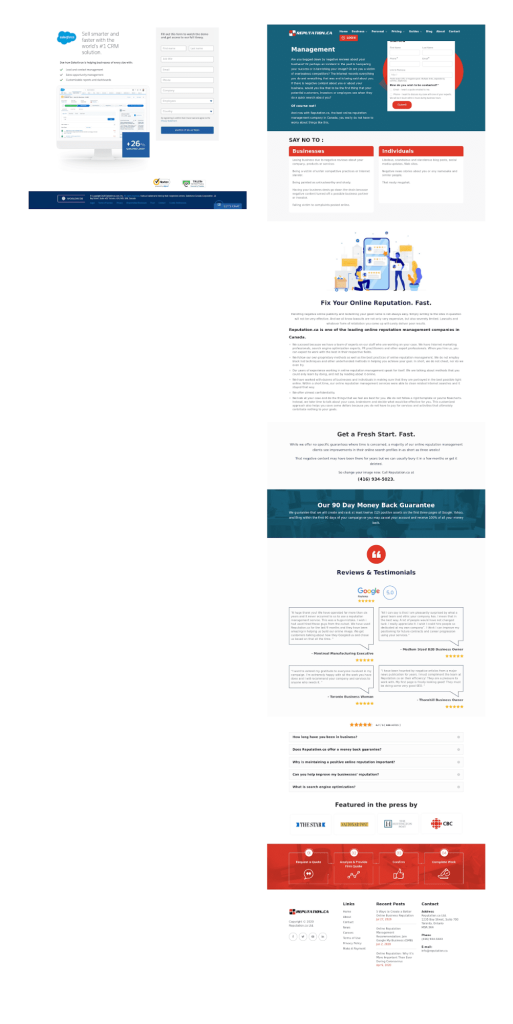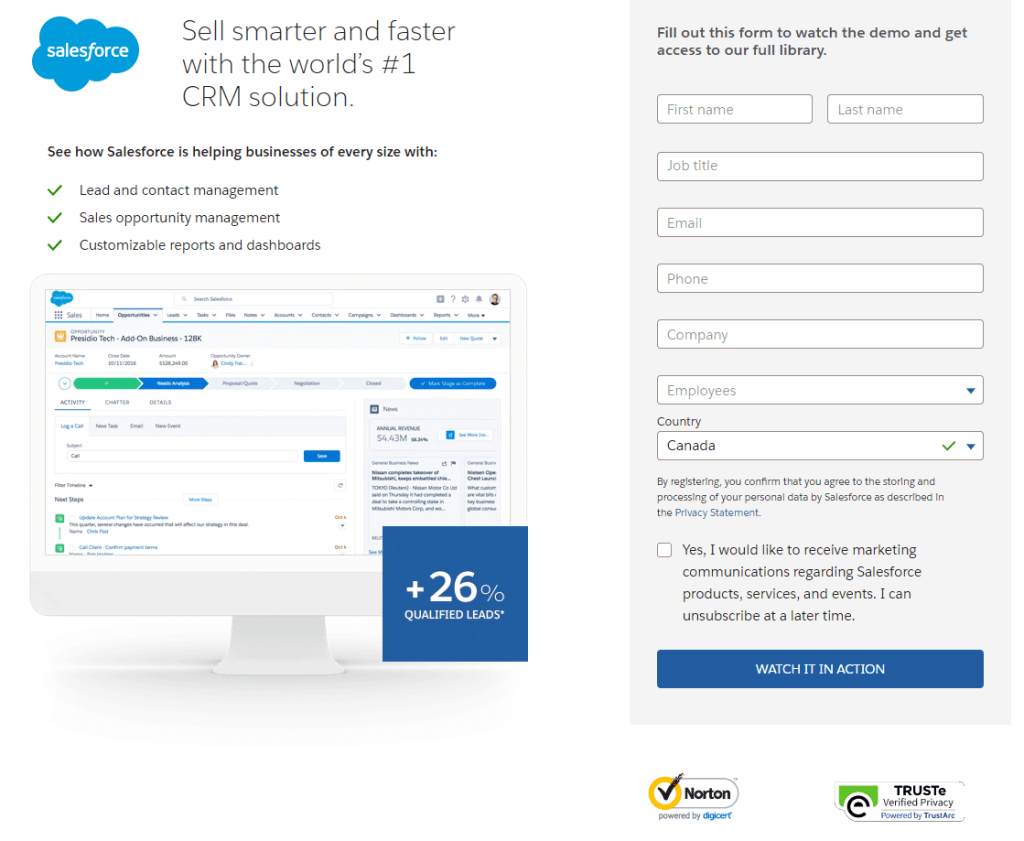The quality of your landing page copywriting has a major impact on whether potential buyers who arrive on your page choose to buy your product or service.
If you can write attention-grabbing and persuasive landing page copy, you’ll be able to grab your visitor’s attention, tempt them with a call to action (CTA), and increase conversions or lead generation for your campaign. If your landing page copywriting fails to connect with your target audience, you’ll see low conversion rates until you make changes.
In this blog post, we’re offering six tips to help you improve your landing page copywriting and start converting more of your new visitors into fresh leads or first-time buyers.
[optin-inline id=’dmpl7wrwcq0wrkfgyrxb’]
6 Best Ways to Improve Your Landing Page Copywriting
Experiment with Short and Long Form Landing Pages
When you’re creating a landing page to support your advertising campaign, one of the first things you’ll need to decide is whether to create a long-form landing page or a short-form landing page.
Short-form landing pages are typically no more than a single page in length. They can incorporate many landing page design elements, including headlines, a landing page offer and description, social proof, and one or more CTA buttons. Short form landing pages are ideal for email opt-in offers and lead generation campaigns where advertisers can maximize their results by reducing friction and making it quick and easy for visitors to submit their best email address.
Long-form landing pages can be three, five, or even twenty pages in length (or more!). They typically include extensive additional information about the landing page offer, such as unique features, benefits, proof points, use cases, special offers, and other details.

Caption: Examples of a short-form vs long-form landing page.
Long-form landing pages are better suited for campaigns whose conversion target is to sell a product or service. A long-form landing page can include more answers to customer questions, helping customers overcome their buying objections and making conversions more likely to happen.
Marketers can improve their landing page copywriting by creating and utilizing both types of landing pages appropriately based on their campaign objectives.
Write a Powerful Headline
When a visitor lands on your landing page, the first thing they’re going to read is your headline. By the time they’ve finished reading your headline, visitors will have decided to either keep reading or exit your landing page without reading any more.
With that in mind, your headline has exactly one job: to convince readers that it’s worth their time and effort to stay on your page and find out what you’re offering.
Your headline should be present in large type at the top of your page, where it’s impossible for your audience to miss. Crafting the perfect headline comes down to understanding the key pain points for your target market and connecting that with a solution you can offer.

Caption: Here’s a closer look at this short-form landing page created by Salesforce. The heading is in large type at the top of the page and immediately tells visitors exactly how Salesforce will make their lives better: by helping them generate sales at a faster rate. Promising a desired outcome to your visitors is a great way to grab their attention with a headline.
Perfect Your Unique Value Proposition
Once you’ve grabbed your potential buyer’s attention with a headline that piques their interest, how will you convince them to submit their email or buy your product? One essential tool you’ll need is your unique value propositions or UVPs.
A UVP is a concise statement about what makes your brand, product, or service unique and valuable for your customers. In perfecting your UVP, you’ll need to think carefully about why customers should buy your product, what pain points you address, and what sets you apart from the competition. As you develop your value propositions, you’ll gain a better understanding of what benefits matter to your customers and how to emphasize those benefits in your landing page copy.
Make Your Copy Easy to Read
Making your landing page copywriting easier to read could increase conversions for your next PPC advertising campaign. There are two important factors you should pay attention to here:
Writing Concise Copy
Whether you choose a short-form or long-form approach for your landing page, writing concise copy is one of the keys to an effective landing page. Express yourself clearly and in as few words as possible. Use simple and short sentences with a clear meaning. Edit your copy by removing as many needless words as possible.
Writing Accessible Copy
The average American adult reads at an 8th-grade level. If you’re creating a landing page for B2C, it stands to reason that you should write your landing page copy using language that the average person can understand.

You can use the Hemingway web app to evaluate your landing page copy for readability and make sure it’s accessible for your audience.
Build Trust Using Social Proof
Sometimes, the most high-performing landing page copy isn’t written by advertisers at all – it comes in the form of testimonials and success stories that are contributed by customers. These are examples of social proof marketing, a landing page strategy designed to show visitors that your company is successful and connected in the community, ultimately encouraging them to take action and purchase your product or service.
Some common examples of social proof on landing pages include:
- Testimonials and customer quotations
- Partner logos or badges
- Trust badges
- Usership or distribution statistics
- Celebrity endorsement
- Social media shares and engagement
- Business awards
Using social proof on your landing pages shows your visitors that you’ve already created relationships and delivered positive results in the community. As a result, they’ll be more likely to perceive your business as trustworthy and convert on your landing page offers.
Write a Compelling Call to Action
Besides the headline, the CTA is the most important part of any landing page. A CTA speaks to your visitors directly, encouraging them to convert on your offer and move into the next stage of the sales/marketing funnel. An effective call to action is:
- Short and concise
- Impossible to miss on the page
- Action-oriented, speaking directly to the audience in the imperative voice
- Creating urgency and encouraging visitors to take action
The most effective landing pages combine a high-contrast CTA button with lots of white space and few alternative navigation options. These design features reduce distractions on the page so visitors stay focused on the offer and are more likely to convert.
Summary
Learning how to create a landing page is about understanding the pain points and challenges faced by your audience, then figuring out how to grab their attention, convey the benefits of your product, win their trust, and ultimately get them to convert on your offer.
As you improve your landing page copywriting, you’ll find it gets easier and easier to craft the captivating headlines, hard-hitting UVPs, and compelling CTAs that encourage conversions and drive campaign outcomes.
-
CEO Garrett Mehrguth
Did you enjoy this article?
Share it with someone!

